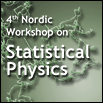Speaker
Prof.
Yasser Roudi
(NTNU, Kavli Institute for Systems Neuroscience)
Description
Our understanding of complex systems is typically limited by
the fact that we only see a fraction of the variables
describing these systems: we only see parts of a financial
market, we typically only see and analyze subparts of a
protein protein interaction network, and we can only record
from the activity of few cells in the brain; a potentially
large number of variables in these systems are not directly
observed and measured. In addition to the existence of
unknown (hidden) variables, we face the problem that we
cannot even monitor the known (observed) variables for a
very long time, that is, we may have under-sampled data. In
many cases we may not even know that other variables beyond
what we see exist and influence our system, that is we may
be dealing with "unknown unknowns". What is the effect of
this incomplete data? This question can be posed as a
problem of inference in the presence of latent variable,
something that people in machine learning are very
interested in. In this talk, I will describe some results on
how not knowing the relevant variables influences our effort
in modeling complex systems. I will describe recent advances
in statistical modeling of data in which by using techniques
from non-equilibrium statistical physics we can build
efficient approaches to take into account the influence of
hidden variable.
References.
B. Dunn, Y. Roudi (2013) in press, arXiv:1301.7275v1
M. Marsili, I. Mastromatteo, Y. Roudi (2013) arxiv 2013
arXiv:1301.3622v2
J. Tyrcha, J. Hertz (2013) arXiv:1301.7274v1

